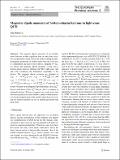Bu öğeden alıntı yapmak, öğeye bağlanmak için bu tanımlayıcıyı kullanınız:
http://hdl.handle.net/11547/11153| Başlık: | EXAMINATION OF THE RELATIONSHIP BETWEEN EMOTION REGULATION AND DECISION-MAKING SKILLS OF ORIENTEERING ATHLETES |
| Yazarlar: | Akyüz, Abdulsamed |
| Yayın Tarihi: | 2022 |
| Seri/Rapor No:: | 13; |
| Özet: | The aim of the study is to examine the relationship between emotion regulation skills and decision-making skills of orienteering athletes together with some demographic characteristics. This research is descriptive research in relational screening model. The sample of the study consisted of orienteering athletes over the age of 18 who were active in 2021-2022 in Istanbul. The sample of the research consists of 300 active orienteering athletes selected by convenience sampling method. Of these athletes, 82% (n: 246) are male and 18% (n: 18) are female. The Rational and Intuitive Decision-Making Styles scale developed by Ime et al. (2020) was used to measure the decision-making skills of orienteering athletes, and the Athlete Emotion Regulation Scale developed by Tingaz and Altun (2021) was used to measure the emotion regulation skills of orienteering athletes. SPSS 25.0 program was used in the analysis of the data. In the analysis of the data, descriptive statistics, pairwise comparisons t test and Pearson Correlation test were used. When the change of the athlete emotion regulation scale according to gender is examined; female athlete emotion regulation level is significantly higher than males. When the rational and intuitive decision-making styles scale according to gender is examined, it has been observed that the total of the scale differs significantly in favour of male according to gender. The total rational and intuitive decision-making scale was positively correlated with the overall athlete emotion regulation scale at the level of .327, with the suppression sub-dimension at the level of .302, and with cognitive reappraisal at the level of .241. It was found that the rational sub-dimension was positively correlated with the athlete's emotion regulation scale at the level of .242, positively at the level of .181 with the suppression sub-dimension, and positively at the level of .234 with the cognitive reappraisal. It was found that the intuitive sub-dimension had a positive correlation at the level of .256 with the athlete's emotion regulation scale, a positive correlation at the level of .266 with the suppression sub-dimension, and a positive correlation at the level of .149 with the cognitive reappraisal. |
| URI: | http://hdl.handle.net/11547/11153 |
| ISSN: | 0976-9234 2229-7723 |
| Koleksiyonlarda Görünür: | Web Of Science |
Bu öğenin dosyaları:
| Dosya | Açıklama | Boyut | Biçim | |
|---|---|---|---|---|
| s10052-023-12055-z.pdf | 494.96 kB | Adobe PDF |  Göster/Aç |
DSpace'deki bütün öğeler, aksi belirtilmedikçe, tüm hakları saklı tutulmak şartıyla telif hakkı ile korunmaktadır.
